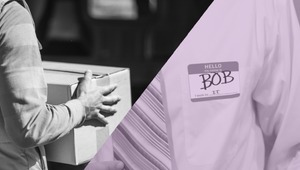
How Brand Destinations Are Intoxicating the Drinks Industry

Finding ways to grow and innovate during a global health crisis is no easy task. But despite 18 months of social restrictions and limited access to pubs, bars, live music venues and nightclubs, the drinks sector has seen enormous growth in many areas.
As people’s lifestyles significantly changed as a result of the pandemic, many drinks brands showed inspired creativity as they galvanized to meet new consumer demands.
In 2020, sales of alcoholic drinks in the UK grew by 16.3% with even stronger growth in the low- and no-alcohol sector where sales jumped 30%, according to marketing intelligence agency Mintel. At home, drinking was invariably one of the few pleasures open to locked-down citizens; now, as the world begins to reopen, the opportunities for this sector to build brand experiences are magnified.
In September, the new Johnnie Walker Journey of Flavour immersive brand experience will open in Edinburgh, Scotland, one of the most recent examples of a spirits brand tapping into the latest sector trends with a brand home. The value of brand homes as part of alcohol beverages’ marketing strategies is evident— our research shows that almost half (49%) of brand home visitors go on to purchase products more frequently following their visit.
There are several standout trends impacting this sector that are important for brands to recognize when creating experiences that meet the changing behaviours and habits of consumers.
Reframing colonial stereotypes
The Black Lives Matter movement has encouraged many companies to reassess various aspects of their business practices to improve diversity—as seen with Diageo’s pledge to ensure 45% of its upper management are from ethnically diverse backgrounds by 2030 and Pernod-Ricard’s app enabling consumers to report hate speech online.
"A simple switch from the word ‘tiki’ to ‘tropical’ and the removal of any offending iconography reframes the whole experience."
Rethinking the language used to describe drinks and drinking experiences is a way of ensuring this awareness is present in all aspects of a brand experience. For example, the problem of the classic tiki aesthetic and cocktail style is that “tiki” is a word steeped in colonialism and stereotypes. Not only do Pacific Islanders find the word offensive, but they also take offense to the heavily themed bars of the same name that are often decorated with statues of sacred gods and mythological characters. A simple switch from the word “tiki” to “tropical” and the removal of any offending iconography reframes the experience while staying true to the fun aesthetic.
Some of the most popular spirits—for example, gin and rum—have complex colonial histories. Rum is inextricably linked to the slave trade in the Americas, and gin and tonic were used to combat malaria in Africa and India so that Europeans could have more successful colonizing expeditions.
There is an opportunity to acknowledge and address this history in more detail in brand experiences.
Brand homes offer the space to tell a brand’s story, and our research found that 50% of visitors leave more familiar with the history of the product. In London, Beefeater Gin’s Distillery Experience features a historical experience that shines a light on the early years when quality was uncontrolled—acknowledging the reality of the drink’s past and how regulation and quality crafting has improved.

Healthier options
The shift toward low- and no-alcohol drinks (NoLo) was fast-tracked during the lockdown, with sales soaring by 30%, according to IWSR data covering about 75% of global consumption.
British supermarket chain Sainsbury’s promoted its NoLo options with The Clean Vic pop-up pub, one of several examples across the world of the growth in dedicated NoLo bars such as Pernod Ricard’s Virgin Mary Bar opening in the UAE and the first permanent non-alcoholic bar in Japan.
With brand homes, there is the opportunity to demonstrate the craft that goes into NoLo and explore its health benefits. In addition, they offer a place to incubate new products. As a result of a brand home visit, 59% of people are more familiar with the processes behind its products.
New formats, digital and physical
Creative efforts undertaken by bars, restaurants and brand homes to remain visible to consumers during lockdown have paid dividends, providing new revenue opportunities. For example, brand homes like Martell in Cognac, France have found that sales of limited edition products have grown as local residents want to support their community businesses while enjoying a more unique tipple at home.
For brand homes especially, Covid curtailed plans for attracting global customers to their physical locations, accelerating the need for an authentic and impactful virtual experience.
A great example comes from Rabbit Hole bourbon in Louisville, Kentucky, where physical hosts became virtual to guide customers through an online world. This allows Rabbit Hole, at a time where travel restrictions are still tight, to reach a potentially endless number of customers across the globe. This experience is now a key part of its business, even with the return of in-person visits.
Not only does innovating through virtual technology allow brands to reach more customers, it also enables them to create more seamless experiences and connect more deeply.
Brand homes have needed to transcend bricks and mortar, and technology is now a critical part of the experience. From fully immersive experiences to the ability to self-explore through touchscreens or visual displays, visitors expect to experience something new and different in this space.
This sector has had to respond to changes forced on it by the pandemic and recognize the broader trends impacting it. As customers embrace a more opened up world, new opportunities will emerge that can maximize the impact of brand experiences.
This article first appeared on AdWeek.















